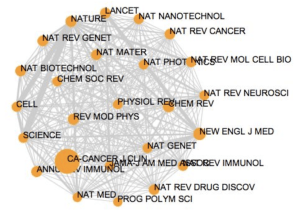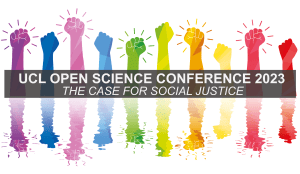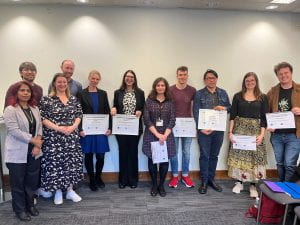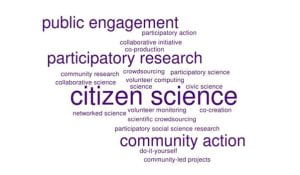This year we are pleased to be able to share with you our Advent Calendar of Research Support! We will be posting every day over on our Twitter/X account but for those of you that aren’t using Twitter/X we have posted it below, and you can visit it online in your own time. We will also be updating this post throughout the month with accessible version of the content.
Day 1
The Office for Open Science and Scholarship is your one stop shop for advice and support for all things openness. Find out more on our website: https://www.ucl.ac.uk/library/open-science-research-support/ucl-office-open-science-and-scholarship #ResearchSupportAdvent
Image by Alejandro Salinas Lopez “alperucho” on UCL imagestore. A Christmas tree with white lights at night in front of columns lit with colours of the rainbow.
Day 2
Profiles is UCL’s new public search and discovery tool showcasing the UCL community. Use it to find UCL academics, their activities, collaborations, industry partnerships, publications and more. Profiles replaces the previous IRIS system: https://www.ucl.ac.uk/library/open-science-research-support/ucl-profiles #ResearchSupportAdvent
Image by Mat Wright on UCL imagestore. A girl with dark hair and wire rimmed glasses wearing a yellow jumper sits at a laptop. In the background can be seen colourful book stacks.
Day 3
If you need a more controlled way of sharing your research data, check out the UK Data Service and its granular controls for accessing data. https://ukdataservice.ac.uk/learning-hub/research-data-management/data-protection/access-control/ #ResearchSupportAdvent
Image by Alejandro Walter Salinas Lopez on UCL imagestore. Six people in office attire facing a bright yellow wall covered in postit notes
Day 4 
Our final UCL Profiles training session of the year will be held on 7 December at 12pm. Come along to find out how to update your profile and manage your professional and teaching activities in RPS. https://library-calendars.ucl.ac.uk/calendar/libraryskillsUCL?t=g&q=profiles&cid=6984&cal=6984&inc=0
If you can’t make the session, have a look at our Getting started with Profiles page: https://www.ucl.ac.uk/library/open-science-research-support/ucl-profiles #ResearchSupportAdvent
Image by Mary Hinkley on UCL imagestore. A mixed group of people around a table working at laptops.
Day 5
Are you interested in citizen science or participatory research? Ever wondered whether such an approach might work for your project? Whether you are new to citizen science or if you’ve run projects including participants before, come and join our informal UCL Citizen Science community to exchange ideas, ask for advice or share your stories! #ResearchSupportAdvent https://teams.microsoft.com/l/team/19%3aEU3Ia83bPWRqzrGpqQ1KkqlQ0AC5f4Ip8Y-zclJ-PHc1%40thread.tacv2/conversations?groupId=54f252f7-db72-40df-8faf-20e618d9a977&tenantId=1faf88fe-a998-4c5b-93c9-210a11d9a5c2
Image by Alejandro Salinas Lopez “alperucho” on UCL imagestore. A group of three women in warm clothing toasting with cups of coffee at night.
Day 6
Ever hit a paywall when trying to access scholarly publications? Get the popcorn ready, and be prepared to have your eyes opened by watching this documentary ‘Paywall: the Business of Scholarship’ at https://paywallthemovie.com/ #OpenAccess #ResearchSupportAdvent
Image by Alejandro Salinas Lopez “alperucho” on UCL imagestore. A plate of mince pies.
Day 7
Have you ever received an unsolicited email from a publisher inviting you to publish your research in their journal? Think, Check, before you submit. https://thinkchecksubmit.org/ #ThinkCheckSubmit #ResearchSupportAdvent
Image from ThinkCheckSubmit. Traffic lights containing the words Think, Check, Submit.
Day 8
If you’re sharing your data using the UCL Research Data Repository, reserve your DOI when you create the item. Then when you submit a paper for publication you can include it in the data access statement and readers will be able to find your data more easily once the data is published. https://www.ucl.ac.uk/library/open-science-research-support/research-data-management/ucl-research-data-repository #ResearchSupportAdvent
Image by UCL Media Services on UCL imagestore. A close up of a bright purple bauble on a tree with some blue lights.
Day 9
Are festive songs, recipes and party activities protected by copyright? How does this relate to your research? Answers in our latest copyright blog post: https://blogs.ucl.ac.uk/copyright/#ResearchSupportAdvent
Image by KamranAydinov on Freepik. Blue headphones surrounded by christmas decorations, stockings, candles, tree lights and pine cones.
Day 10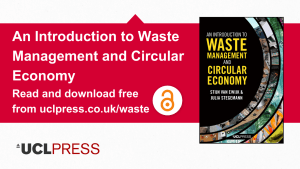
UCL Press has launched the first #openaccess textbook in its new programme today. Take a look here: https://www.uclpress.co.uk/products/215121. Interested in publishing an #openaccess textbook with us? Find out more: https://www.uclpress.co.uk/pages/textbooks
Image by UCL Press. Image is a red band on a white background. On the red band, white writing reads, ‘An introduction to Waste management and circular economy. Read and download free from uclpress.co.uk/waste.
Day 11
If you’ve encountered a paywall when trying to read research online, Unpaywall (https://unpaywall.org/) and the Open Access Button (https://openaccessbutton.org/) are two free browser extensions which search the internet for copies that you can access. #ResearchSupportAdvent
Image by Mary Hinkley on UCL imagestore. A close up of a Christmas tree covered in yellow lights and small silver leaves. In the background can be seen a grey building, some leafless trees and a dark grey statue of a man.
Day 12
Do you have a namesake in the world of research? To ensure that other researchers and publishers are not confusing you with someone else, sign up for an ORCID ID at https://orcid.org/ ORCID brings all your scholarly output together in one place. Read more here: https://www.ucl.ac.uk/library/open-science-research-support/open-access/orcid-ucl-researchers #ResearcherIDs #ORCID #ResearchSupportAdvent
Image by John Moloney on UCL imagestore. A group of people in business attire socialising with drinks. Picture is taken from a distance and slightly above.
Day 13
Grey literature is produced and published by non-commercial private or public entities, including pressure groups, charities and organisations. Researchers often use grey literature in their reviews to bring in other ‘voices’ into their research. We have listed some useful sources on our guide: https://library-guides.ucl.ac.uk/planning-search/grey-literature #literaturereview #greyliterature #ResearchSupportAdvent
Image by Irrum Ali on UCL imagestore. A white table covered in books and pamphlets of various sizes.
Day 14
Are you working with personal data and need more advice on the difference between anonymisation and pseudonymisation? Check out the data protection team’s guide or get in touch with them for more advice. #ResearchSupportAdvent https://www.ucl.ac.uk/data-protection/guidance-staff-students-and-researchers/practical-data-protection-guidance-notices/anonymisation-and
Image by Mary Hinkley on UCL imagestore. Two large and several small icicles against a wintery sky.
Day 15
Historical Inquiry is an important part of the research process. A place to begin this is by understanding the etymology of words. Raymond Williams began this by collating keywords of the most used terms. However, the meanings of words change over time, depending on context. The University of Pittsburgh has continued this project: https://keywords.pitt.edu/, and we have their publication in the Library. #HistoricalInquiry #ResearchSupportAdvent
Image by Mat Wright on UCL imagestore. A student with long blonde hair studies in the foreground. Behind her are rows of wooden desks and book stacks in arches sit further back.
Day 16
Did you know the Research Data Management team can review your Data Management Plan and provide feedback, including to make sure you adhere to funder guidance on data management? Get in touch to send us a plan or find out more. https://www.ucl.ac.uk/library/open-science-research-support/research-data-management #ResearchSupportAdvent
Image by Mary Hinkley on UCL imagestore. UCL front quad at twilight. In front of the portico is a Christmas tree decorated with yellow lights. To the right of the image is a leafless tree decorated with purple and pink lights which can be seen reflecting off the white building beyond.
Day 17
From 2024, UKRI funded long-form outputs must be open access within 12 months of publication under CC BY or another Creative Commons licence. UCL’s Open Access Team has info. including funding & exceptions, and offers support: https://www.ucl.ac.uk/library/open-science-research-support/open-access/research-funders/new-wellcome-and-ukri-policies/ukri #ResearchSupportAdvent
Image by James Tye on UCL imagestore. Image shows a view through a gap in books to a woman with light brown hair holding the books open and appearing to be searching the shelf.
Day 18
To coincide with the new UKRI open access policy for monographs, UCL Library Services has new funding to support all UCL REF-eligible staff who would like to make their monographs, book chapters and edited collections Gold open access. Find out about this funding and how to contact us: https://www.ucl.ac.uk/library/open-science-research-support/open-access/open-access-funding-and-agreements/open-access-funding #ResearchSupportAdvent
Image by Alejandro Salinas Lopez “alperucho” on UCL imagestore. Image shows a Christmas garland over and arch with people walking through, slightly out of focus. The garland is threaded with yellow lights and the words Happy Holiday Season are written in pink lights.
Day 19
Interested in adding grey literature into your research? Have a look at Overton – a database of 10m+ official and policy documents http://libproxy.ucl.ac.uk/login?url=https://app.overton.io/dashboard.php#ResearchSupportAdvent
Image by Tony Slade from UCL imagestore. A top-down photograph of four students working individually at wooden desks. To the right of the image are wooden bookcases full of colourful books.
Day 20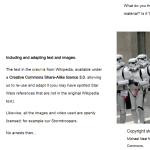
Have time in your hands this holiday? Complete our short, fun, Jedi-friendly copyright online tutorial and be copyright-savvy before the new year begins! Access at: https://www.ucl.ac.uk/library/forms/articulate/copyright-essentials/#/ #ResearchSupportAdvent
A screenshot from the UCL Copyright Essentials module. Includes information on the topics covered, some text from the module and an image of a group of stormtroopers marching in the street. Includes image by Michael Neel via Wikimedia Commons.
Day 21
Beat the cold with #openaccess reading! UCL Press have more than 300 open access books and 15 journals for you to read and download- for free! Available from: uclpress.co.uk
Image by Tony Slade on UCL imagestore. A close-up perspective shot of a bookcase. Black books with gold writing are in the foreground and red, orange and blue volumes are further back.
Day 22
Have you made your New Year resolutions yet? Start by developing your copyright knowledge. Register for one of our 2024 workshops to learn how copyright supports your research and learning. #ResearchSupportAdvent https://library-calendars.ucl.ac.uk/calendar/libraryskillsUCL/?cid=-1&t=g&d=0000-00-00&cal=-1&ct=32648&inc=0
Image by KamranAydinov on Freepik. Top view of hand holding a pen on spiral notebook with new year writing and drawings decoration accessories on black background.
Day 23
Curious to see who’s talking about your research? You can see a dashboard for all your RPS publications in the Altmetric tool – search by “verified author”. https://www.altmetric.com/explorer/#ResearchSupportAdvent
Image by Alejandro Salinas Lopez “alperucho” on UCL imagestore. An arm and hand in profile holds up a mobile phone with the camera open. The phone shows the UCL portico and Christmas tree. The background is out of focus but appears to show Christmas lights.
 Day 24
Day 24
The final day of our #ResearchSupportAdvent is upon us and we want to use it to say thank you to everyone that has supported us, come to our events, training or shared with us. Also our colleagues and friends from other institutions. All of us here in the UCL Office for Open Science & Scholarship and beyond across all of the teams represented wish you a great break and look forward to 2024!

 The UCL Office for Open Science and Scholarship invites you to contribute to the open science and scholarship movement. Stay connected for updates, events, and opportunities. Follow us on X, formerly Twitter, LinkedIn, and join our mailing list to be part of the conversation!
The UCL Office for Open Science and Scholarship invites you to contribute to the open science and scholarship movement. Stay connected for updates, events, and opportunities. Follow us on X, formerly Twitter, LinkedIn, and join our mailing list to be part of the conversation! Close
Close













